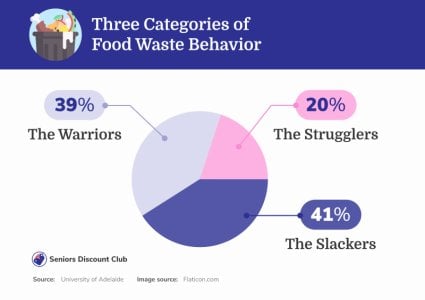Uncover Your Food Waste Habits: Discover Which of These Three Household Categories You Belong To!
By
Seia Ibanez
- Replies 8
Food waste continues to be a growing problem in Australia, with a report revealing that 9.5 million tonnes of food is wasted every year.
This is quite an unprecedented phenomenon, especially considering that 70 per cent of this food could have been consumed by people if it wasn't thrown away.
For the average household to cut back on food waste, it’s helpful to identify what kind of food waste behaviours they're exhibiting first.
This helps them target their efforts in a more meaningful way, and the University of Adelaide has just released a new study to help households understand where they stand.
The team surveyed 939 households on two key behaviours: the generating and sorting of food waste. Through this data, they've discovered three distinct categories of food waste behaviour.

1. The Warriors (39 per cent)
These are the conservationists of the food waste world! This group generally has low food waste or they try to avoid it altogether. They also make sure to sort their food waste sustainably.
Typical warriors are older, retired folks. They often tend to live alone or in small adult-only households.
2. The Strugglers (20 per cent)
For strugglers, their households have high levels of food waste but try to manage it with medium levels of sorting efforts.
Strugglers tend to be parents managing a household with kids.

3. The Slackers (41 per cent)
Study shows that slackers are 41 per cent of households that have low food waste, however, very little of it is sorted sustainably.
Slacker households tend to be young people living in rather small households.
The 'Warriors' style of waste management is certainly admirable, but even slackers and strugglers can make a difference!
If you're interested in cutting down on food waste, there are a few guidelines you could adopt. Some suggestions include using a portion planner when you cook and swapping out fresh foods for frozen alternatives that last longer.
Using leftovers creatively is another key tactic in reducing food waste. Look at leftovers as ingredients for new meals. With a little bit of creativity - and maybe a quick internet search for recipe ideas - you can turn leftover chicken into a delicious chicken salad, mashed potatoes into a shepherd's pie, or a mix of vegetable scraps into a nourishing soup.
Another easy way to cut down on waste is to properly store your groceries when you get home. Make sure you refrigerate or freeze fresh produce as quickly as possible to lengthen its lifespan. And when it comes to leftovers, freeze them so that they won’t get spoiled immediately.
Lastly, composting is a beneficial food waste reduction strategy. For peels or scraps, composting allows them to nourish future plants. Even if you live in an urban area with no space for a garden, look for local composting programs that might be able to use your scraps.
It’s also worth mentioning that food waste isn't just a financial burden–it's also contributing to climate change, considering the huge amounts of methane gas that are released as our food breaks down.

So, did you learn which kind of household you belong to? Hopefully, this study sheds a bit more light on your food waste behaviours, so you can develop a food waste plan to cut down on sustainability efforts.
In which category do you think you belong to? Let us know in the comments below!
This is quite an unprecedented phenomenon, especially considering that 70 per cent of this food could have been consumed by people if it wasn't thrown away.
For the average household to cut back on food waste, it’s helpful to identify what kind of food waste behaviours they're exhibiting first.
This helps them target their efforts in a more meaningful way, and the University of Adelaide has just released a new study to help households understand where they stand.
The team surveyed 939 households on two key behaviours: the generating and sorting of food waste. Through this data, they've discovered three distinct categories of food waste behaviour.

The University of Adelaide released a new study that determined the three categories of food waste behaviour. Credit: Seniors Discount Club
1. The Warriors (39 per cent)
These are the conservationists of the food waste world! This group generally has low food waste or they try to avoid it altogether. They also make sure to sort their food waste sustainably.
Typical warriors are older, retired folks. They often tend to live alone or in small adult-only households.
2. The Strugglers (20 per cent)
For strugglers, their households have high levels of food waste but try to manage it with medium levels of sorting efforts.
Strugglers tend to be parents managing a household with kids.

If you're interested in cutting down on food waste, there are a few guidelines you could adopt. Credit: Pexels
3. The Slackers (41 per cent)
Study shows that slackers are 41 per cent of households that have low food waste, however, very little of it is sorted sustainably.
Slacker households tend to be young people living in rather small households.
The 'Warriors' style of waste management is certainly admirable, but even slackers and strugglers can make a difference!
If you're interested in cutting down on food waste, there are a few guidelines you could adopt. Some suggestions include using a portion planner when you cook and swapping out fresh foods for frozen alternatives that last longer.
Using leftovers creatively is another key tactic in reducing food waste. Look at leftovers as ingredients for new meals. With a little bit of creativity - and maybe a quick internet search for recipe ideas - you can turn leftover chicken into a delicious chicken salad, mashed potatoes into a shepherd's pie, or a mix of vegetable scraps into a nourishing soup.
Another easy way to cut down on waste is to properly store your groceries when you get home. Make sure you refrigerate or freeze fresh produce as quickly as possible to lengthen its lifespan. And when it comes to leftovers, freeze them so that they won’t get spoiled immediately.
Lastly, composting is a beneficial food waste reduction strategy. For peels or scraps, composting allows them to nourish future plants. Even if you live in an urban area with no space for a garden, look for local composting programs that might be able to use your scraps.
It’s also worth mentioning that food waste isn't just a financial burden–it's also contributing to climate change, considering the huge amounts of methane gas that are released as our food breaks down.
Key Takeaways
- A new study has identified three distinct styles of food waste management in households, labelling them as 'warriors', 'strugglers', and 'slackers'.
- The study conducted by the University of Adelaide found that 'warriors' tend to be older, retired people who manage food waste well; 'strugglers' are typically busy parents with high food waste levels; and 'slackers' are younger people who generate less waste but do not manage it well.
- The researchers hope that these findings could help create more tailored interventions to reduce food waste, particularly for the 'strugglers' group.
So, did you learn which kind of household you belong to? Hopefully, this study sheds a bit more light on your food waste behaviours, so you can develop a food waste plan to cut down on sustainability efforts.
In which category do you think you belong to? Let us know in the comments below!
Last edited:







